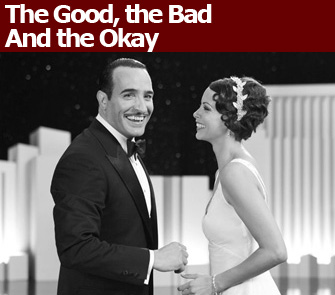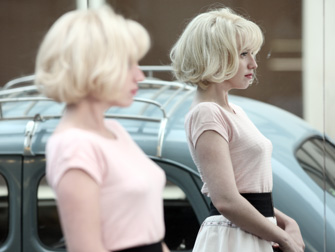
Three films first seen at the Cannes Film Festival last summer have opened recently in Paris: The Artist, directed by Michel Hazanavicius, for which Jean Dujardin won the prize for best actor at this year’s festival; Christophe Honoré’s new offering, Les Bien Aimés; and Julie Delpy’s Le Skylab, both of which appeared out of competition at Cannes.
When I saw the trailer to The Artist, I feared that it would amount to little more than a pastiche of silent movies, but it turned out to be much, much more than that. On one level, it is a beautifully crafted love letter to a medium that was destroyed by the emergence of the talkies. On another, it is the absorbing story of silent movie idol George Valentin (Dujardin) and his relationship with actress Peppy Miller (Bérénice Dejo), whose career in the talking movies is flourishing while Valentin’s is declining. Much of the film acts as a commentary on its own craft, and there are some wonderfully memorable scenes, not least the final silent film made by Valentin that ends with the actor being swallowed up by quicksand. Dujardin not only fits the part perfectly with his matinee idol looks but also delivers a performance of great subtlety. Given that the actors have no spoken dialogue and the intertitles are used sparingly, it might have been tempting to overact, but both Dujardin and Dejo judge their roles to perfection.
Director Hazanavicius makes very skilful use of the silent medium, only on two occasions using sound, to very telling effect. The Artist also works as a commentary on Hollywood and the ridiculous decision to distinguish between English- and foreign-language films at the Oscars, because, ironically, this French movie, with a French director and two leading French actors, may well be a contender for the main Oscar for best film next year, as no foreign words are uttered in the course of the movie!
Don’t be put off by the trailer: The Artist is an absolute treat. And I, who have a very low tolerance level for cute animals in movies, was completely won over by the dog in the film.
After the great success of Christophe Honoré’s previous film, Les Chansons d’Amour, the director clearly felt that if he used many of the same actors, added a few big hitters (not least Catherine Deneuve) and employed the same

formula (the characters singing songs by Alex Beaupain about the complexities of love), Les Bien Aimés (Beloved) would be a sure-fire hit. Unfortunately, he was wrong.
Although the scenes with Deneuve and her real-life daughter Chiara Mastroianni are always engrossing, the movie as a whole lacks the magic and believability of the earlier work. Perhaps the problem lies with its overambitious structure, which moves between the 1960s and the present day, and its setting in several cities, including Paris, Prague, London, Montreal and New York, whereas Les Chansons d’Amour was entirely based in modern-day Paris. Overall, a great disappointment.
Julie Delpy gets credits for writing, directing and acting in Le Skylab. Although the story of a large family gathering in the French countryside (in this case, Brittany) is a formula overused in French cinema, this film has much to recommend it, with some very good ensemble acting, not least by the many children.

Clearly inspired by Delpy’s own childhood, the movie is set in 1979 at the moment that the space station Skylab was due to crash to earth and revolves around 11-year-old Albertine (Lou Alvarez), who longs to leave childhood behind and become a woman. The period detail is punctilious, and there are many amusing moments, but this film would have been far more successful with more rigorous editing. Too many episodes (singing songs, telling stories) are simply too long to maintain full attention, and what could have been a very good 90-minute film has become only a moderately successful 115-minute offering. But the movie is worth it for the performance of Vincent Lacoste (first seen in Les Beaux Gosses) alone as a moody, ever-so-cool adolescent, embarrassed by both the adults and the children in his family.
Favorite
